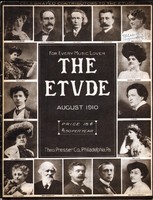That the Mexicans have a wind instrument called Ac'ocotl, which is played by inhaling through it instead of blowing upon it? It is made of the dried stalk of a plant.
That any sound with more than 4,224 vibrations per second is so disagreeable that the human ear ceases to recognize it as music, although sounds can be made with vibrations as high as 36,500?
That the Te Deum Laudamus (We Paise (sic) Thee, O God) has been used in the church services since the fourth century?
That the librettos of Eugene Scribe, the French playwright, are responsible for the success of many operas? Few operas survive if they have bad librettos. Scribe wrote in all 100 librettos including Auber's Fra Diavolo, Meyerbeer's Robert Huguenots, Prophête, Boieldieu's La Dame Blanche, and Halèvy's La Juive.
That Schubert was frequently paid less than twenty-five cents for a song or a piano piece? He was usually in such hard straits that he was very glad to get even this amount. How ironical is the inscription on his tombstone, "Music has entombed here a rich treasure."



